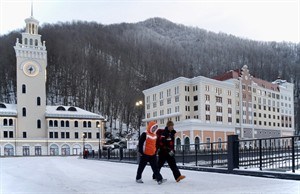
In this photo dated Feb. 11, 2012, part of the ski resort constructions in Krasnaya Polyana near the Black Sea resort of Sochi, southern Russia, is shown. THE CANADIAN PRESS/AP, Igor Yakunin
April 16, 2013 - 9:34 AM
MOSCOW - Russian officials gave mixed signals Tuesday over whether they needed to increase security at key sporting events like the World Athletics Championship and the 2014 Winter Olympics after explosions at Boston's marathon killed three people and wounded over 170.
The track and field championship, which takes place in Moscow on Aug. 10-18, is seen as a dress rehearsal for the 2014 Olympic games in the Black Sea resort of Sochi.
One top sports official said security was being beefed up but others said Russia's take on Olympic security was already very robust.
Officials will speak with the organizers of the Boston marathon to find out what more security precautions are needed, Mikhail Butov, secretary general of the Russian Athletics Federation, said Tuesday.
"Our security measures are tough as they are," Butov told The Associated Press. "But when it's clear what actually happened (in Boston), we will draw our own conclusions."
Federation President Valentin Balakhnichev told the Interfax news agency that the Boston bombings on Monday revealed "problems" in ensuring security at outdoors events and expressed concern that it may inspire "other organizers of terrorist attacks."
Police and security services in Moscow are gearing to up for "all possible emergencies" even though the athletics championships will be held in a confined space indoors at the Luzhniki Stadium.
"Safety, safety and safety is our priority," Alexander Polinsky, the head of the events department at the Moscow City Hall, said according to Interfax.
Russian Sports Minister Vitaly Mutko described the attack in Boston as "a grave signal."
"Naturally, we're beefing up security measures," Mutko said in remarks carried by the R-Sport news agency. He defended the tough security measures Russian officials put in place at sporting events despite complaints by some foreign officials and athletes who consider them excessive.
Alexander Zhukov, head of the Russian Olympic Committee, said there would be no need to enhance Sochi's security after the Boston bombing, saying that "security measures in Sochi are already quite serious."
The Interior Ministry said in a statement Tuesday it has fully deployed the police force that would be in place during the Sochi Olympics and has conducted regular checks of all Olympic venues to make sure they are fully protected.
The ministry said it has paid particular attention to monitoring labourers who have worked at the Olympic construction sites. It added that security regime in Sochi will be further tightened starting June 1, but didn't elaborate on details.
Security precautions in Sochi were high and visible at international test events in January and February. Some athletes were bemused by what they described as unprecedented security measures, including patrols of guards with assault rifles as well as constant credentials checks.
From the entrance to the cable car at the foot of the mountain to the slopes at the top, security guards and volunteers checked credentials every step of the way. During a single journey, it wasn't unusual for a badge to be meticulously scrutinized at least a dozen times. Guards with assault rifles and German shepherds patrolled the sports venues in groups, although they tried to keep a low profile.
In February, Dmitry Chernyshenko, chief of the 2014 Sochi Organizing Committee, insisted that the security measures would be exactly the same during the games.
Some analysts have warned, however, that beefed-up police presence and rigorous security checks wouldn't be enough to fend off terror threats.
"They rely on forceful methods to ensure security, but that doesn't give a full guarantee," said Alexander Konovalov, head of the Institute of Strategic Assessment and Analysis, an independent think-tank.
He said international terror groups could be encouraged by the carnage in Boston to plot against the Sochi Olympics.
"The terrorists' strategy is to create a sense of panic and leave an impression that they can strike any target, no matter how tightly it's protected," Konovalov said. "The Olympics would make a highly desirable goal for terrorists, offering the maximum publicity. The media effect and panic would hugely multiply the impact of even a small explosion."
Sochi is in southern Russia, a region that has been destabilized by an Islamic insurgency that has spread after two separatist wars in Chechnya.
The Caspian Sea province of Dagestan, about 500 kilometres east of Sochi, is the current epicentre of the insurgency, where bombings and shootings targeting police and other officials occur almost daily. In recent years, however, militants focused on fighting authorities in the North Caucasus region and refrained from hitting the rest of Russia like they did in the past.
Ivan Melnikov, a lawmaker who sits on the board of the National Anti-Terror Committee, acknowledged that terrorists could be tempted to strike Sochi.
"Undoubtedly, the Sochi Olympics may face such threats," he said, according to Interfax, adding that Russian security agencies have the "resources to ensure security at the highest level."
__
Vladimir Isachenkov and Yelena Yegorova contributed to this report.
News from © The Associated Press, 2013